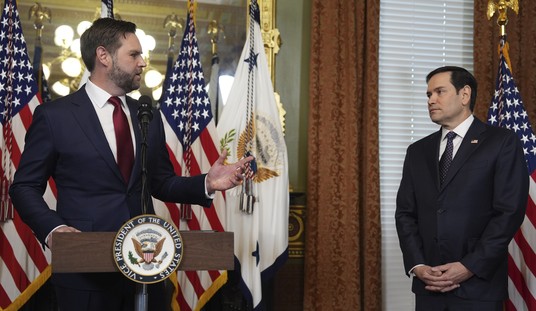New Jersey Gov. Chris Christie followed George W. Bush on the stage at the Bush Institute Conference on Taxes and Economic Growth in New York today. Bush introduced Christie with apt words, complimenting the governor’s “enormous personality” and “belief in the individual.” Bush’s comments were more than justified by the content of Christie’s speech. With typical relentless, attention-getting honesty, Christie forecast a dire future for the country if we succumb to the left’s vision:
Christie said he hasn’t seen a less optimistic period in the country in his lifetime.
“Government’s telling them stop dreaming, stop striving, we’ll take care of you,” he said at a theater at the New York Historical Society. “We’re turning into a paternalistic entitlement society. That will not just bankrupt us financially, it will bankrupt us morally.”
“We’ll have a bunch of people sitting on a couch waiting for their next government check,” Christie said.
Christie wasn’t content to merely point out the negative, though: He launched rapidly into an articulation of an alternate vision, the vision he’s implemented in the state of New Jersey. He cited his recent veto of a millionaire’s tax and his current push for a 10 percent income tax cut as examples of pro-growth policies.
He also had interesting words about the importance of in-person interaction with those with whom we disagree. “We developed relationships with the other side of the aisle that allowed them to trust us. And that doesn’t happen overnight,” he said.”Day after day after day you have to sit with our colleagues and convince them of the goodness of your spirit and of the understanding that compromise is not a dirty word.”
“The goodness of your spirit.” Christie clearly recognizes what too many conservatives do not: Liberals, no less than conservatives, think they take the moral, principled approach to politics. Liberals often don’t recognize their own ambition, the influence the possibility of power exerts on them and the views they ultimately adopt.
The subject of “compromise” has itself become a controversial concept. As ideological purity has come to be valued above all, we’ve forgotten that we’re not just responsible for our moral claims, but also for the consequences of our action and inaction. As Michael Novak writes in his essay, “Errand into the Wilderness,” “I learned … that I must never again seek moral purity at the expense of responsibility for the results.”
The question of compromise is one that I haven’t yet resolved for myself, but Christie’s words come as an encouragement as I grapple with the question of when to stand on principle — even if it means someone else is able to run amok in the implementation of principles that are completely contrary to my own — and when to compromise. The first key is to forge relationships with those with whom we disagree. It’s indispensable and important, just as it’s indispensable and important to forge relationships with like-minded folks so as to be fortified when victory in the fight appears impossible.








Join the conversation as a VIP Member